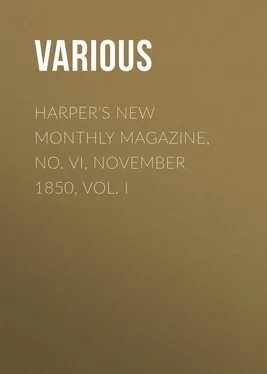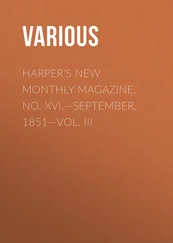Various - Harper's New Monthly Magazine, No. VI, November 1850, Vol. I
Здесь есть возможность читать онлайн «Various - Harper's New Monthly Magazine, No. VI, November 1850, Vol. I» — ознакомительный отрывок электронной книги совершенно бесплатно, а после прочтения отрывка купить полную версию. В некоторых случаях можно слушать аудио, скачать через торрент в формате fb2 и присутствует краткое содержание. Издательство: Иностранный паблик, Жанр: periodic, foreign_edu, на английском языке. Описание произведения, (предисловие) а так же отзывы посетителей доступны на портале библиотеки ЛибКат.
- Название:Harper's New Monthly Magazine, No. VI, November 1850, Vol. I
- Автор:
- Издательство:Иностранный паблик
- Жанр:
- Год:неизвестен
- ISBN:нет данных
- Рейтинг книги:5 / 5. Голосов: 1
-
Избранное:Добавить в избранное
- Отзывы:
-
Ваша оценка:
- 100
- 1
- 2
- 3
- 4
- 5
Harper's New Monthly Magazine, No. VI, November 1850, Vol. I: краткое содержание, описание и аннотация
Предлагаем к чтению аннотацию, описание, краткое содержание или предисловие (зависит от того, что написал сам автор книги «Harper's New Monthly Magazine, No. VI, November 1850, Vol. I»). Если вы не нашли необходимую информацию о книге — напишите в комментариях, мы постараемся отыскать её.
Harper's New Monthly Magazine, No. VI, November 1850, Vol. I — читать онлайн ознакомительный отрывок
Ниже представлен текст книги, разбитый по страницам. Система сохранения места последней прочитанной страницы, позволяет с удобством читать онлайн бесплатно книгу «Harper's New Monthly Magazine, No. VI, November 1850, Vol. I», без необходимости каждый раз заново искать на чём Вы остановились. Поставьте закладку, и сможете в любой момент перейти на страницу, на которой закончили чтение.
Интервал:
Закладка:
then to the thoughtful dweller must come the spirit of the place and hour to weave a gorgeous tapestry, rich with pictures, illustrative of the heroic age of our young republic. My tarry was brief and busy, for the sun was rapidly descending – it even touched the forest tops before I finished the drawing – but the cordial reception and polite attentions which I received from the proprietor, and his warm approval of, and expressed interest for the success of my labors, occupy a space in memory like that of a long, bright summer day.
This mansion stands upon the upper of two terraces, which are ascended each by five stone steps. At each front corner of the house is a lofty elm – mere saplings when Washington beheld them, but now stately and patriarchal in appearance. Other elms, with flowers and shrubbery, beautify the grounds around it; while within, iconoclastic innovation has not been allowed to enter with its mallet and trowel, to mar the work of the ancient builder, and to cover with the vulgar stucco of modern art the carved cornices and paneled wainscots that first enriched it. I might give a long list of eminent persons whose former presence in those spacious rooms adds interest to retrospection, but they are elsewhere identified with scenes more personal and important. I can not refrain, however, from noticing the visit of one, who, though a dark child of Africa and a bond-woman, received the most polite attention from the commander-in-chief. This was Phillis, a slave of Mr. Wheatley, of Boston. She was brought from Africa when between seven and eight years old. She seemed to acquire knowledge intuitively; became a poet of considerable merit, and corresponded with such eminent persons as the Countess of Huntingdon, Earl of Dartmouth, Reverend George Whitefield, and others. Washington invited her to visit him at Cambridge, which she did a few days before the British evacuated Boston; her master among others, having left the city by permission, and retired, with his family, to Chelsea. She passed half an hour with the commander-in-chief, from whom and his officers she received marked attention. 6 6 Phillis wrote a letter to General Washington in October, 1775, in which she inclosed a poem eulogistic of his character. In February following the general answered it. I give a copy of his letter, in illustration of the excellence of the mind and heart of that great man, always so kind and courteous to the most humble, even when pressed with arduous public duties. "Cambridge, February 28, 1776. "Miss Phillis – Your favor of the 26th of October did not reach my hands till the middle of December. Time enough, you will say, to have given an answer ere this. Granted. But a variety of important occurrences, continually interposing to distract the mind and withdraw the attention, I hope will apologize for the delay, and plead my excuse for the seeming but not real neglect. I thank you most sincerely for your polite notice of me in the elegant lines you inclosed; and however undeserving I may be of such encomium and panegyric, the style and manner exhibit a striking proof of your poetical talents; in honor of which, and as a tribute justly due to you, I would have published the poem, had I not been apprehensive that, while I only meant to give the world this new instance of your genius, I might have incurred the imputation of vanity. This, and nothing else, determined me not to give it a place in the public prints. If you should ever come to Cambridge, or near head-quarters, I shall be happy to see a person so favored by the Muses, and to whom nature has been so liberal and beneficent in her dispensations. I am, with great respect, your obedient, humble servant, Geo. Washington."
A few rods above the residence of Professor Longfellow is the house in which the Brunswick general, the Baron Riedesel, and his family were quartered, during the stay of the captive army of Burgoyne in the vicinity of Boston. I was not aware when I visited Cambridge, that the old mansion was still in existence; but, through the kindness of Mr. Longfellow, I am able to present the features of its southern front, with a description. In style it is very much like that of Washington's head-quarters, and the general appearance of the grounds around is similar. It is shaded by noble linden-trees, and adorned with shrubbery, presenting to the eye all the attractions noticed by the Baroness of Riedesel in her charming letters. 7Upon a window-pane on the north side of the house may be seen the undoubted autograph of that accomplished woman, inscribed with a diamond point. It is an interesting memento, and is preserved with great care. The annexed is a facsimile of it.
During the first moments of the soft evening twilight I sketched the "Washington elm," one of the ancient anakim of the primeval forest, older, probably, by a half century or more, than the welcome of Samoset to the white settlers. It stands upon Washington-street, near the westerly corner of the Common, and is distinguished by the circumstance that, beneath its broad shadow, General Washington first drew his sword as commander-in-chief of the Continental army, on the 3d of July, 1775. Thin lines of clouds, glowing in the light of the setting sun like bars of gold, streaked the western sky, and so prolonged the twilight by reflection, that I had ample time to finish my drawing before the night shadows dimmed the paper.
Early on the following morning I procured a chaise to visit Charlestown and Dorchester Heights. I rode first to the former place, and climbed to the summit of the great obelisk that stands upon the site of the redoubt upon Breed's Hill. As I ascended the steps which lead from the street to the smooth gravel-walks upon the eminence whereon the "Bunker Hill Monument" stands, I experienced a feeling of disappointment and regret, not easily to be expressed. Before me was the great memento, huge and grand – all that patriotic reverence could wish – but the ditch scooped out by Prescott's toilers on that starry night in June, and the mounds that were upheaved to protect them from the shots of the astonished Britons, were effaced, and no more vestiges remain of the handiwork of those in whose honor and to whose memory this obelisk was raised, than of Roman conquests in the shadow of Trajan's column – of the naval battles of Nelson around his monument in Trafalgar-square, or of French victories in the Place Vendôme. The fosse and the breast-works were all quite prominent when the foundation-stone of the monument was laid, and a little care, directed by good taste, might have preserved them in their interesting state of half ruin until the passage of the present century, or, at least, until the sublime centenary of the battle should be celebrated. Could the visitor look upon the works of the patriots themselves, associations a hundred-fold more interesting would crowd the mind, for wonderfully suggestive of thought are the slightest relics of the past when linked with noble deeds. A soft green sward, as even as the rind of a fair apple, and cut by eight straight gravel-walks, diverging from the monument, is substituted by art for the venerated irregularities made by the old mattock and spade. The spot is beautiful to the eye untrained by appreciating affection for hallowed things; nevertheless, there is palpable desecration that may hardly be forgiven.
The view from the top of the monument, for extent, variety, and beauty, is certainly one of the finest in the world. A "York shilling" is charged for the privilege of ascending the monument. The view from its summit is "a shilling show" worth a thousand miles of travel to see. Boston, its harbor, and the beautiful country around, mottled with villages, are spread out like a vast painting, and on every side the eye may rest upon localities of great historical interest, Cambridge, Roxbury, Chelsea, Quincy, Medford, Marblehead, Dorchester, and other places, where
Читать дальшеИнтервал:
Закладка:
Похожие книги на «Harper's New Monthly Magazine, No. VI, November 1850, Vol. I»
Представляем Вашему вниманию похожие книги на «Harper's New Monthly Magazine, No. VI, November 1850, Vol. I» списком для выбора. Мы отобрали схожую по названию и смыслу литературу в надежде предоставить читателям больше вариантов отыскать новые, интересные, ещё непрочитанные произведения.
Обсуждение, отзывы о книге «Harper's New Monthly Magazine, No. VI, November 1850, Vol. I» и просто собственные мнения читателей. Оставьте ваши комментарии, напишите, что Вы думаете о произведении, его смысле или главных героях. Укажите что конкретно понравилось, а что нет, и почему Вы так считаете.












